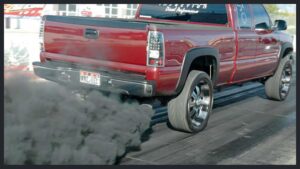
3 Ways to Reduce Black Smoke in Diesel Engines
Diesel cars often get a bad rap because they can emit black smoke from their exhaust.
To the casual observer, these vehicles appear to be more polluting than any other vehicle that uses gasoline. After all, you don’t typically see black smoke coming from the exhaust of a traditional gasoline-engine car.
However, both types of engines are equally harmful to the environment. The only difference is that gasoline engines produce white or invisible exhaust gases. That’s why they don’t get as much criticism as diesel engines. Bad looks are often the motivation for change.
How to Reduce Black Smoke from Diesel Trucks and Cars
If your exhaust is producing black smoke, there are steps you can take to reduce the amount of smoke. Even if you don’t care about the appearance of the black smoke, it’s important to reduce it, at least for economic reasons.
If your car continues to produce black smoke, it’s likely that you’ll get fewer miles per gallon. This means more trips to the gas station and more of your hard-earned money spent on gas.
Fuel prices are high enough as they are, so if you care about your car’s fuel economy, you need to take the necessary steps to prevent this. Here are three ways to reduce black smoke in diesel-engine vehicles:
1) Common Rail Fuel Injection System
New diesel vehicles are also now available with a common rail fuel injection system. This is a high-pressure injection system that delivers fuel directly to a solenoid valve. In older diesel vehicles, the nozzles used a low-pressure system to pump the fuel. This usually results in black smoke. However, modern common rail systems like those found in Duramax engines produce very little black smoke or emissions.
If you’re buying a diesel truck, try to look for one with a common rail fuel injection system. You’ll automatically have a vehicle that produces less black smoke.
2) Change (or clean) your air filter.
The combustion process in diesel vehicles requires an adequate supply of air to completely burn the fuel. If the engine doesn’t get enough air, the fuel will only partially burn. The result is black smoke coming out of the exhaust system.
Fuel needs to be completely burned because it produces water and carbon dioxide. These two elements don’t produce black smoke. That’s why the right combination of air and fuel is so important if you want to avoid black smoke.
Checking your air filter for clogged or dirty air is easier than you think. This may be preventing air from entering. In this case, you should either replace the air filter or, if you have a reusable filter such as a K&N, clean it following the instructions that came with it.
3) Fuel Additives
As you continue to drive your car, combustion deposits and dirt will gradually build up in the cylinder chambers and injectors. These deposits mix with the fuel and do two things.
First, they reduce engine performance and fuel consumption. Second, they cause black smoke to come out of your exhaust system.
Fortunately, there are cleaning additives that can be added to diesel fuel to remove these harmful deposits. Doing this should make the black smoke go away after a few days.

